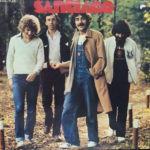
Proof positive that maybe the Germans were on to something. In 1979, the independent German music critics’ association bestowed upon Santiago’s Walking the Voodoo Nights their highest honor, the Deutscher Schallplattenpreis. For album of the year — knee deep in the time of punk and post-punk — one wouldn’t think that such a high honor would be given to something that sounds decidedly out of step with the critical mass. Listening to the album one can’t help but understand why. A sterling example of how many ideas you can eke out of AOR, boogie, and Latin-lilting funk, Walking the Voodoo Nights still has an undeniable groove that can make anyone a believer of what they heard.
Santiago holds a distinct history. Initially, in 1973, they began as a Chilean group founded by Tato Gomez and Mario Argandoña both Santiago, Chile homegrowns. Mario Argandoña by then was more widely known as one of the leads in the Chilean version of Jesus Christ Superstar. Sometime, a year later, they decided to head over to Germany and try their luck as a Soft Rock/Glam outfit along the lines of America, CSNY, and the Bay City Rollers. Not finding much luck with their slightly milquetoast brand of adult contemporary, they decided to chuck/dismiss the rest of the band and audition new members out.
Eventually, they would be joined by two, other forward-facing members: English guitarist John Parsons and American Serge Maillard who were restless, with some band they were backing up in Köln, Germany. Both expertly, classically trained musicians that wanted something new, knew that Santiago was it. Together, in this new supergroup, is where they’d go for it.
Enlisting the unheralded work of keyboardists Steve Porcaro who would later join Toto (amongst adding his spice to other, countless AOR gems) and Focus mastermind Thijs van Leer to help them arrange some of their songs, somehow, Santiago finally struck on something just right for them. Santiago stumbled upon the sound of gorgeous, blue-eyed (or in this case brown-eyed) soul with an experimental, funky edge you’d be hard pressed to hear on other releases from that time — one aided even further by others like Paulinho Da Costa who injects his magical percussive touch on the more Latin-influenced cuts, likewise that goes for Chilean piano player Paco Saval. From the opener, the title track “Walking The Voodoo Nights” to the closer “Love Is A Boomerang” what is immediately striking are the shifting moods, vocals, and ideas that the group traffics in.
Elegant, post-disco in the vein of Heatwave, and Off the Wall kicks off the album. “Walking The Voodoo Nights” doses background sonics that accentuate the true strengths of the group — vocal harmonies backed up with floating synth pads and a funky as hell rhythm section. Then floating, quasi-Brazilian influenced boogie that touches on smooth Philly blue-eyed soul of Boz Scaggs and Hall & Oates, while erring on the side of more permanent, personal stuff, like the music of F/S fave Ned Doheny. Then, as you get into your head that the rest of the album is going to flow into this laid back, groovy sultriness — Santiago hits you with the next track a curiously constructed vocoder-folk pop song “Feeling Alive” that sounds so silly on paper, yet sounds as good on headphones. Like the Doobies meeting up with Roger Troutman, at their peak, you know you’d like to hear something like that…
It’s no use speaking of who is singing what on each song. Most songs are led by Serge Maillard, who for some reason, would never be heard from again. However, each song shows a democratic sense of spirit, one that seems to spur them to just try interesting shit and pull it off. Everyone, sans John (too shy to sing, perhaps?!?), gets their chance to shine, or at least add something to the overall pleasant sheen of the album. What rules, to this day, is how merciless they were in injecting some hard grooves to whatever song they’re performing.
Hitting you with shoulda-been hit after shoulda-been hit, from “Berangére” to “Vaso De Vino”, Walking The Voodoo Nights just flows like a wicked DJ playlist, allowing you forget/forgive the more dodgy ones like “Get Her On the Line” and “Love Is A Boomerang” (which Pilot or Ambrosia would have killed for, though…) that are preciously little found in the mix. There’s a reason I picked the song “Just Another Night Flight” to title my first mix at FOND/SOUND. Trafficking in all sorts of smooth moves and multi-genre ideas, the seams always threaten to part the song but the music never lets it, it’s far too well-crafted to. And somehow, fittingly, this group was gone as soon as it landed. A German-only release, never reissued since 1979, one only wonders how much longer this should last.
